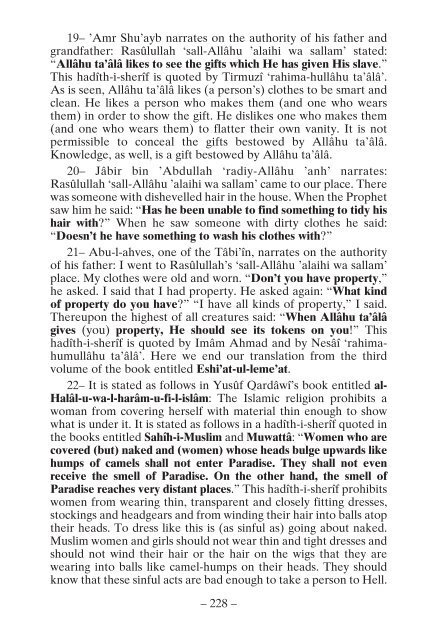Miftah-ul-Janna (Booklet for way to Paradise)
You also want an ePaper? Increase the reach of your titles
YUMPU automatically turns print PDFs into web optimized ePapers that Google loves.
19– ’Amr Shu’ayb narrates on the authority of his father and<br />
grandfather: Rasûl<strong>ul</strong>lah ‘sall-Allâhu ’alaihi wa sallam’ stated:<br />
“Allâhu ta’âlâ likes <strong>to</strong> see the gifts which He has given His slave.”<br />
This hadîth-i-sherîf is quoted by Tirmuzî ‘rahima-h<strong>ul</strong>lâhu ta’âlâ’.<br />
As is seen, Allâhu ta’âlâ likes (a person’s) clothes <strong>to</strong> be smart and<br />
clean. He likes a person who makes them (and one who wears<br />
them) in order <strong>to</strong> show the gift. He dislikes one who makes them<br />
(and one who wears them) <strong>to</strong> flatter their own vanity. It is not<br />
permissible <strong>to</strong> conceal the gifts bes<strong>to</strong>wed by Allâhu ta’âlâ.<br />
Knowledge, as well, is a gift bes<strong>to</strong>wed by Allâhu ta’âlâ.<br />
20– Jâbir bin ’Abd<strong>ul</strong>lah ‘radiy-Allâhu ’anh’ narrates:<br />
Rasûl<strong>ul</strong>lah ‘sall-Allâhu ’alaihi wa sallam’ came <strong>to</strong> our place. There<br />
was someone with dishevelled hair in the house. When the Prophet<br />
saw him he said: “Has he been unable <strong>to</strong> find something <strong>to</strong> tidy his<br />
hair with?” When he saw someone with dirty clothes he said:<br />
“Doesn’t he have something <strong>to</strong> wash his clothes with?”<br />
21– Abu-l-ahves, one of the Tâbi’în, narrates on the authority<br />
of his father: I went <strong>to</strong> Rasûl<strong>ul</strong>lah’s ‘sall-Allâhu ’alaihi wa sallam’<br />
place. My clothes were old and worn. “Don’t you have property,”<br />
he asked. I said that I had property. He asked again: “What kind<br />
of property do you have?” “I have all kinds of property,” I said.<br />
Thereupon the highest of all creatures said: “When Allâhu ta’âlâ<br />
gives (you) property, He sho<strong>ul</strong>d see its <strong>to</strong>kens on you!” This<br />
hadîth-i-sherîf is quoted by Imâm Ahmad and by Nesâî ‘rahimahum<strong>ul</strong>lâhu<br />
ta’âlâ’. Here we end our translation from the third<br />
volume of the book entitled Eshi’at-<strong>ul</strong>-leme’at.<br />
22– It is stated as follows in Yusûf Qardâwî’s book entitled al-<br />
Halâl-u-wa-l-harâm-u-fi-l-islâm: The Islamic religion prohibits a<br />
woman from covering herself with material thin enough <strong>to</strong> show<br />
what is under it. It is stated as follows in a hadîth-i-sherîf quoted in<br />
the books entitled Sahîh-i-Muslim and Muwattâ: “Women who are<br />
covered (but) naked and (women) whose heads b<strong>ul</strong>ge upwards like<br />
humps of camels shall not enter <strong>Paradise</strong>. They shall not even<br />
receive the smell of <strong>Paradise</strong>. On the other hand, the smell of<br />
<strong>Paradise</strong> reaches very distant places.” This hadîth-i-sherîf prohibits<br />
women from wearing thin, transparent and closely fitting dresses,<br />
s<strong>to</strong>ckings and headgears and from winding their hair in<strong>to</strong> balls a<strong>to</strong>p<br />
their heads. To dress like this is (as sinf<strong>ul</strong> as) going about naked.<br />
Muslim women and girls sho<strong>ul</strong>d not wear thin and tight dresses and<br />
sho<strong>ul</strong>d not wind their hair or the hair on the wigs that they are<br />
wearing in<strong>to</strong> balls like camel-humps on their heads. They sho<strong>ul</strong>d<br />
know that these sinf<strong>ul</strong> acts are bad enough <strong>to</strong> take a person <strong>to</strong> Hell.<br />
– 228 –

















